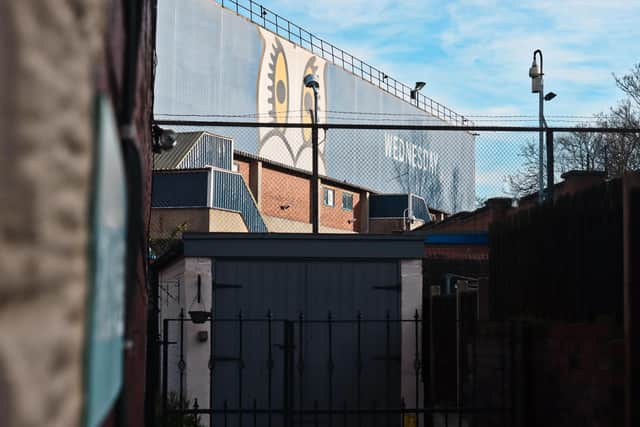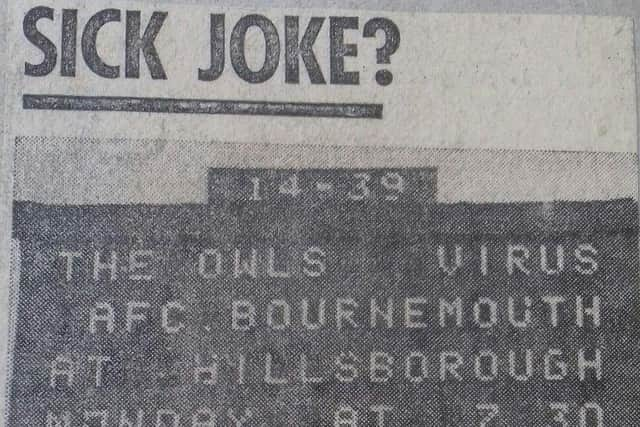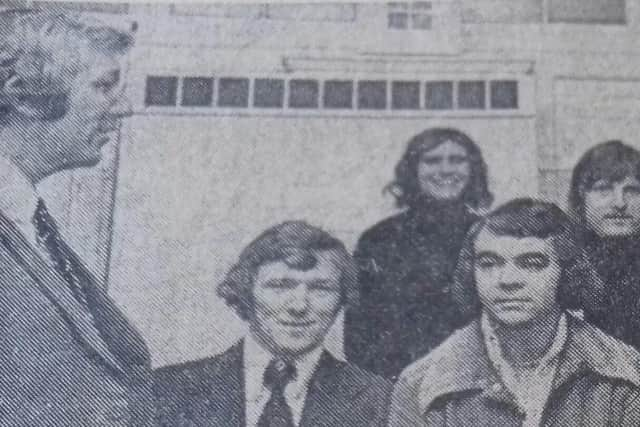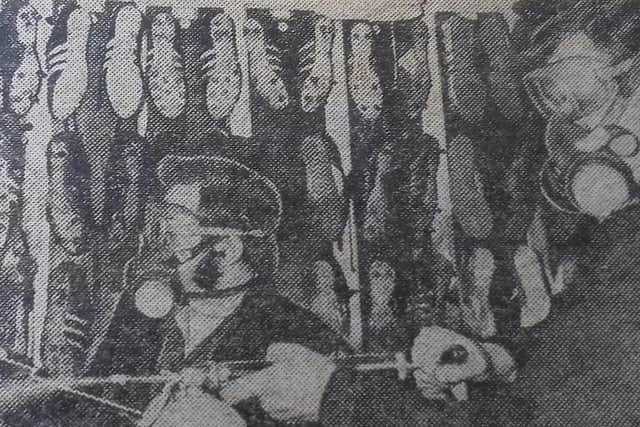Hillsborough evacuated and Middlewood Road fumigated: the last time Sheffield Wednesday's season was decimated by a virus
and live on Freeview channel 276
It’s a minor inconvenience in the miserable world outside the window, of course, but it’s true that since the tragedy of two World Wars and a particularly inclement winter in 1963, the sport has not found itself scrambling for a way forward after the decimation of the football calendar quite like today.
But Sheffield Wednesday’s season being decimated by a mid-season health crisis? Hillsborough and Middlewood Road vacated in an attempt to stop any spread of a feverous illness? It’s happened before. And it’s an under-told story that went some way to triggering one of the club’s most desperate periods.
Advertisement
Hide AdAdvertisement
Hide AdBoth Owls bases were shut down completely, albeit for a shorter time, in 1973, when what was described as a ‘mystery virus’ swept through the club and effectively cost club legend Derek Dooley his job as Owls manager.
Four years later, Wednesday recorded their lowest-ever finish, narrowly avoiding relegation to the fourth tier of English football.
It’s a story picked up by lifelong Wednesdayite John Dyson in his debut book ‘Our Lowest Ebb’, set for release this summer.
Relegated from the old First Division in 1970, two years of mediocrity in the second tier followed before disaster struck.
Advertisement
Hide AdAdvertisement
Hide Ad“Dooley had a reasonable team, they spent two years in midtable and had some good players; Tommy Craig, Peter Rodrigues. But he could never quite get them to go on that next stage and challenge for promotion,” Dyson explains.


“Then the 1973/74 season came along with this virus and the slide started from there. From early September '73 onwards is when players started getting sent home, one or two at a time to begin with. Willie Henderson was the first one.”
Henderson recovered in decent time and the virus failed to take hold of the club until the end of the month. But before long players were reporting symptoms every day and were unable to train. The club was in disarray.
“The big one was John Holsgrove,” Dyson says. “He was the club captain, a big centre-half.
Advertisement
Hide AdAdvertisement
Hide Ad“He collapsed in the dressing room with it and was sent to hospital. His roommate was sent to a hotel to avoid spreading the infection. He didn't play again until March.”


By late October a dozen players were bed-ridden and Owls secretary Eric Taylor submitted a request to the FA to have their next fixture against Notts County postponed.
“The FA said no,” Dyson says. “The rumour was that Eric Taylor and Alan Hardaker basically despised one another. What truth is in that I can't be entirely sure.
“A few days on, on October 27, they managed to scrape a draw against Notts County with a team of youth players. They decided then on October 30 that all team areas, the team rooms, the training ground and so on all had to be closed and that various areas had to be sealed off and fumigated.
Advertisement
Hide AdAdvertisement
Hide Ad“At it's worst there were 12 out and if you look at the team against Notts County they've got five players from the youth team.


“The next five games in the league were all lost. The cup game was an 8-2 defeat at QPR, they were being battered every week with half a team out.”
That downward spiral went a long, long way beyond five matches, however. A League Cup win against Bournemouth from the division below followed that draw with County but the knock-on effects of that horror month saw them wait until the end of January for their next win – a run of 14 matches.
Club legend Dooley, who still holds the unlikely-to-be-beaten Wednesday record of 46 goals in a single season back in the 1952/53 season, had been picked out of the club’s commercial office to take the reigns of the cash-strapped club three years earlier.
Advertisement
Hide AdAdvertisement
Hide AdHis refusal to make a public excuse of the virus was admirable but may have cost him his job. He was sacked on Christmas Eve as the Owls edged closer and closer to a relegation scrap.
Dooley’s programme notes in his penultimate match, a 3-0 defeat to Fulham on December 15, read: “To go into detail (and there is a lot of detail) about our problems, especially as a result of the virus epidemic, will, I know, sound like excuses.
“You know that I’m not one for making excuses, which is why I haven’t gone on about it… The bug is still biting us, but we’ll beat it yet.”


It was a palaver from which the club didn’t recover for several years, Dyson says: “The team itself just about managed to escape relegation that season, the following season they were relegated and in 75/76 they finished the lowest they've ever finished in their history, one place about relegation to the old division four.
Advertisement
Hide AdAdvertisement
Hide Ad“The virus wasn't the only factor; the club had no money, they hadn't recruited particularly well. There are other reasons, but it was one of the things that kicked off the downfall.”
Wednesday will hope they can bounce back a little better if and when the season resumes in 2020.
John Dyson’s debut book Our Lowest Ebb takes a wistful, nostalgic glance through the club’s struggles of 1973-1976 through the eyes of those who were there.
The book is set to be published by Vertical Editions and is set for release in 2020. Pre-orders for the book can be made HERE.